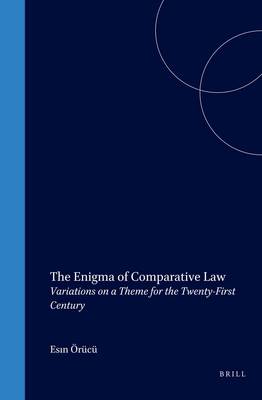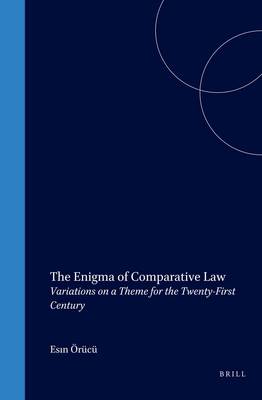
- Afhalen na 1 uur in een winkel met voorraad
- Gratis thuislevering in België vanaf € 30
- Ruim aanbod met 7 miljoen producten
- Afhalen na 1 uur in een winkel met voorraad
- Gratis thuislevering in België vanaf € 30
- Ruim aanbod met 7 miljoen producten
Zoeken
The Enigma of Comparative Law
Variations on a Theme for the Twenty-First Century
Esin Örücü
Paperback | Engels
€ 100,98
+ 201 punten
Omschrijving
Viewing the contested theme Comparative Law as an 'Enigma', this book explores its fundamental issues as sub-themes, each covered in two variations. After the Overture, the author pulls some strands together in the Intermezzo, uses a free hand in the Cadenza, and asks the reader to draw her own conclusions in the Finale. By this method two fundamentally opposed views are exposed in each Chapter. The what, why and how of comparative law, comparative law and legal education, comparative law and judges, and comparative law and law reform by transposition are explored. The author also examines current debates of comparative law such as law and culture, deconstruction of classifications, mixing systems, limits of comparability, convergence/non-convergence and ius commune novum.
By following this two-pronged approach, the book covers many important aspects of comparative law in a refreshing manner not seen in any other work. It is provocative and discursive, bringing together for the reader major developments of comparative law. The book ends by asking 'Where are we going?'.
By following this two-pronged approach, the book covers many important aspects of comparative law in a refreshing manner not seen in any other work. It is provocative and discursive, bringing together for the reader major developments of comparative law. The book ends by asking 'Where are we going?'.
Specificaties
Betrokkenen
- Auteur(s):
- Uitgeverij:
Inhoud
- Aantal bladzijden:
- 242
- Taal:
- Engels
Eigenschappen
- Productcode (EAN):
- 9789004139893
- Verschijningsdatum:
- 1/01/2004
- Uitvoering:
- Paperback
- Formaat:
- Trade paperback (VS)
- Afmetingen:
- 163 mm x 244 mm
- Gewicht:
- 576 g

Alleen bij Standaard Boekhandel
+ 201 punten op je klantenkaart van Standaard Boekhandel
Beoordelingen
We publiceren alleen reviews die voldoen aan de voorwaarden voor reviews. Bekijk onze voorwaarden voor reviews.








